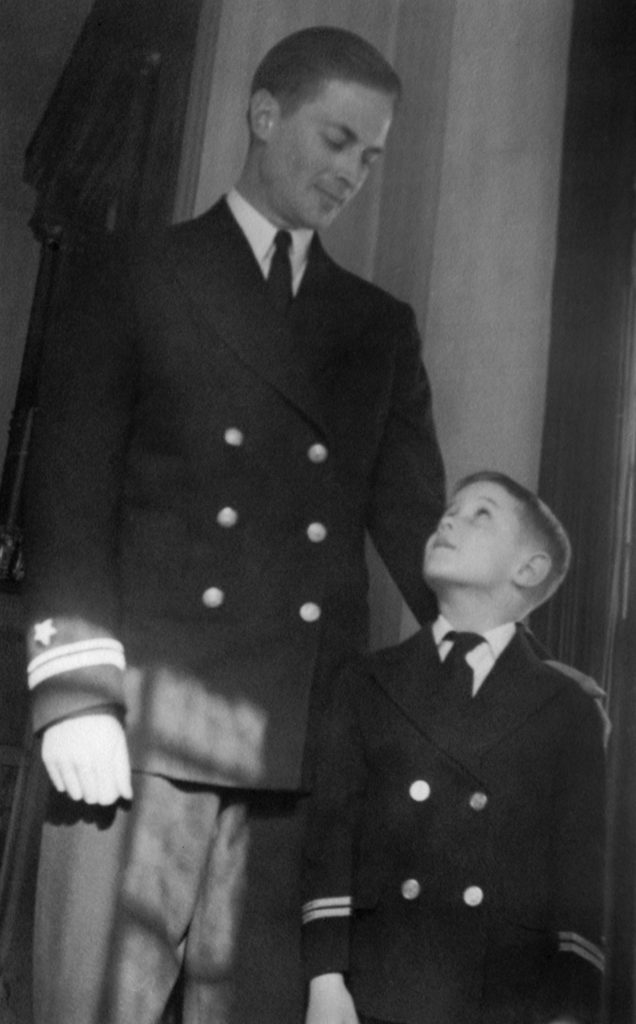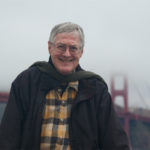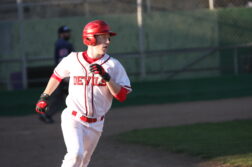
I was born in a small town in Southeastern Nebraska in 1938. There were no town secrets, even from us kids. Everyone knew that Henry’s father had killed himself right before Christmas, when Henry was at kindergarten and his mother was out playing bridge. This death was never discussed. We all knew that Henry’s mother had sent off for a lighted revolving globe as a present for Henry’s father. He was to open it Christmas Eve. We wondered what happened to the globe, but no one ever asked.
* * * * *
Our lives changed in 1941 when the Japanese bombed Pearl Harbor. My dad enlisted in the Navy; it wasn’t long before he was shipped out to the Pacific. That left my mom and me to fend for ourselves.
By the summer of 1944 I was already six. One day the weather was usually hot and sticky, so Mom took us to the community pool. People were uneasy because there had been a drowning there only a few weeks earlier. The pool lifeguard was a hefty woman, Mrs. Fisk. Her one-piece black woolen swimsuit did not fully contain her buttocks. She had plunged in, attempting a rescue.
Perhaps the boy who drowned—he was still in high school—had had some sort of seizure. My mother told me she’d heard he had been epileptic. I had to ask her what that word meant.
The large pool was circular, with Mrs. Fisk’s umbrella chair up on a concrete platform in the center. She had been up there when the boy drowned. She was up there today. I saw her climb the ladder; her skin was wet and had goose bumps. Water flowed from her. The pool looked scary now. Because of the sweltering heat, people were starting to go back to the gathering place of the pool, but they looked uneasy. It wasn’t just me. I looked around: ice cream still melted down waffle cones over fingers, zinc oxide was still smeared across noses. But still.
I sat down on the edge of the pool, immersing my legs. At this moment a teenage boy in a Speedo swimsuit plunged into the water. He went in without a splash—the pure silence your body achieves when it slices into the water at just the right angle. Captivated, I watched him climb back out, blowing water out of his nose into his hand, tugging his scant suit back up into place. He had no fear.
My mother swam and laughed happily with a neighbor lady she had discovered, while I sat at the edge of the pool. Then, before I knew it, there she was calling me: “Okay kiddo, time to call it a day.” Pulling off her puckered swim cap and shaking out her hair, she pointed over to the men’s changing quarters. She’d meet me afterwards. Surely I could manage on my own. I was a big boy.
Just inside the partition to the men’s changing room, I stopped and stood there, frozen to the spot. At first no one noticed. Then the men became concerned, even the tanned toweling-off teens whose skin was surprisingly crisp and white where it had been hidden by their swimsuits. They looked down at me, this small boy, still immobile. For a moment they attributed it to a fear that must have taken hold after the drowning. But when they called out to me, I saw that I was being watched and tore myself away.
I was still only six, but something deep inside me had just been awakened. It was the first time I had ever seen older boys naked, in all their splendor. I was so spellbound by the sight I could not move.
* * * * *
After the war, my dad moved us to Southern California. When I went to high school, although there were group showers after P.E.—wet and slippery naked boys all around me—I knew to avert my eyes.
After graduation, only a few weeks into fall term at Stanford, I discovered the “men’s pool.” Actually, three Olympic-sized outdoor swimming pools, surrounded by a large deck area open to the sun and hidden behind high walls. The most notable feature of the “pool” was that no one was allowed to wear a swim suit. No one could remember the origin of this rule, but no one seemed to mind. The pool was a very popular place. Naked guys were everywhere, swimming or sunbathing, some of them scattered around on the deck or up in the bleachers eating lunch.
One day, as I sat on my towel, a sharp-sweet scent drew my attention to a kid standing over by a trash can, peeling an orange. Carefree and naked, lost in his own world, he stood there, tearing away the rind, absently pushing the flesh of the orange, section by section, into his mouth. A young Apollo eating an orange, I thought to myself, as he stood there in perfect contrapposto. But then I realized that I was staring and he might notice me. I recalled my staring at the boys at the pool back in Nebraska.
Quickly I forced myself to look away. But who else was looking at him? Were there other guys? And if so, how could I connect with them? I didn’t dare risk making a first move. Approaching the wrong person could ruin the rest of my life on campus. And so there we were, those of us, surely, who were watching this boy but all of us just sitting there in hiding.
After graduation, I went off to Europe in 1960. Traveling around, I soon discovered that many of those “hidden” boys weren’t so hidden at all. A quick look over my shoulder at a cute guy would more often than not reveal that he had turned around to look at me, as well. Contact was easy. And finally it was all right to stare.
Eric Wilson has a Stanford Ph.D. in German Literature, and has taught German at UCLA and Pomona College. His fiction writing at UCLA Extension. His fiction and personal essays have been published in Foglifter, 100 Word Story, New England Review, Carve, Literary Hub, Fifth Wednesday Journal, Epoch, Massachusetts Review, Chelsea Station, Carolina Quarterly, as well as in the Pushcart Prize and O. Henry Prize Stories anthologies. An essay of his was listed among the Notables in Best American Travel Writing (2018).






